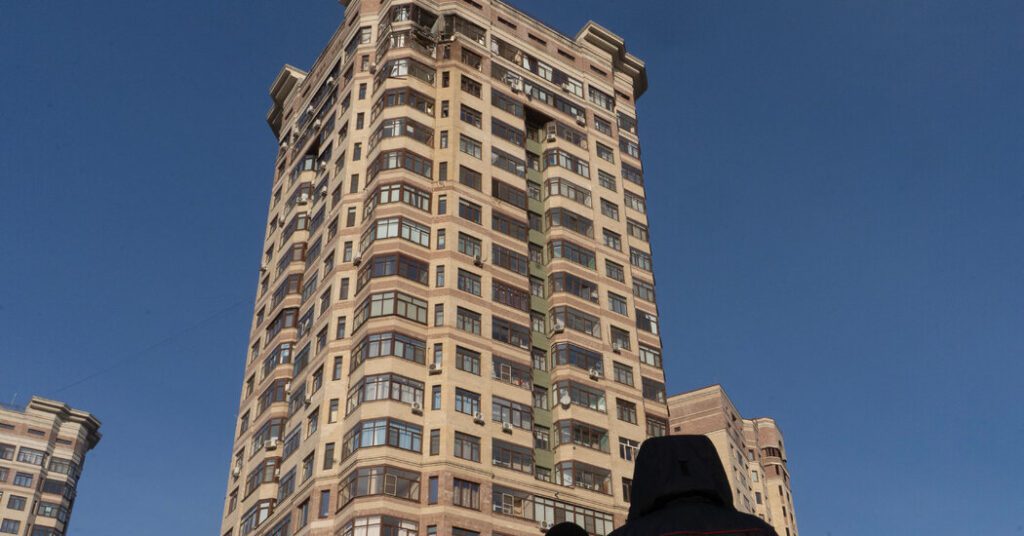Ukraine unleashed one of the war's biggest long-range drone bombardment before dawn on Tuesday with targets across Russia, including dozens of strikes directed towards the Moscow region.
The Russian Ministry of Defense claimed it had fired 337 drones, with at least 91 being sent to the capital and surrounding areas.
Moscow mayor Sergei Sobianin said the attack was the biggest one for the city since the start of the war. Russian authorities said at least two people were killed and another 14 were injured.
In Moscow, at least one residential building was damaged with the roof burnt after the drone explosion. All four international airports serving metropolitan areas of 21 million have been forced to temporarily suspend operations due to the attack, the country's aviation surveillance said.
Ukraine suggested that if Moscow agreed to an equal halt, they would soon stop a long-distance strike to Russia.
Supported by European countries, including France, the plan is envisioned as a first step towards building trust ahead of consultations on the overall conflict.
High-level delegations from Ukraine and the US are scheduled to begin meetings in Saudi Arabia at noon Tuesday, discussing possible paths to end the war.
In addition to a partial ceasefire in the air, Ukraine was also expected to press for the halt of attacks in the Black Sea as a way to measure whether Moscow is willing to take steps to end the battle.
The stabbed strike appeared to be designed as a reminder of Ukraine's continued expansion of its ability to clash with Russia despite suffering brutal attacks and enduring great losses.
President Volodymyr Zelensky said Ukraine is set to produce 30,000 long-range strike drones and 3,000 long-range missiles this year, building its capacity to build domestic weapons even if US military aid is stopped.
Russia has maintained relentless artillery fires against Ukrainian civilians and military institutions during the war. Almost every night, Russia launched more than 100 drones on targets across Ukraine, including the capital Kiev.
The attacks frequently include a combination of ballistic and cruise missiles to saturate Ukraine's air defenses.
The Ukrainian Air Force said the latest attacks from Russia up to Monday and Tuesday morning included 126 drones and one ballistic missile.
As the air defense team scrambled, an explosion echoed through Kiev around midnight, and the Ukrainian Air Force said it had fired or disabled most drones and missiles.
Since President Trump spoke on the phone with President Vladimir V. Putin on February 12, data compiled by the New York Times based on reports from Ukrainian authorities revealed that more than 100 civilians have been killed on Russian strikes.
The escalating strike, with the support of thousands of North Korean soldiers, involved changing the frontline dynamics with the Russian army, seizing most of the territory of Russia's Kursk region, occupying the Ukrainian army.
Kiev wanted to control the area of the land as a leverage for negotiations to end the war, but recent developments may have changed that calculation as the cost of retaining the territory could outweigh the diplomatic benefits.
Kursk's Ukraine salience has now collapsed in the region around Sudzha, with supply lines that are currently under constant attack, about six miles across the border, making the area's hold increasingly unstable.
Oleksandr Silsky, the top Ukrainian military commander, said Kiev was sending reinforcements on Monday night. He rejected Russia's claim that a large force of Ukrainian soldiers was at risk of siege.
“The decision was made to strengthen our group with the necessary forces and resources, including electronic warfare and drones,” he said. “There is no threat to siege of units in the Kursk region at the moment.”
At the same time, there are signs that Russia's attacks in eastern Ukraine are stagnating. Russia has achieved little status for a week, and the Ukrainian army is engaged in limited counterattacks to reclaim patches of small lands, according to military analysts who use combat footage to track daily movements along the front.
In Moscow, the railway tracks near Domodedovo Airport, south of Moscow, were damaged, leading to the halt of train services.
At least 20 cars were burned in the parking lot in the nearby town of Domodedovo, according to Andrei Voloviev, the local governor who issued the statement.
Vorobyev said a 38-year-old security guard was killed at the scene of the attack.

